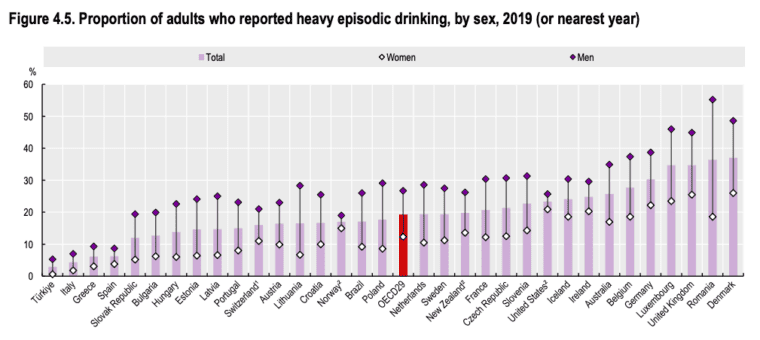The proportion of people engaging in heavy episodic drinking in the UK is the third highest rate across countries analysed, a report by the OECD suggests.
- 26% of women reported engaging in such drinking, the highest rate in the world
- 45% of men did, the 4th highest
- In comparison, in Italy only 2% of women reported heavy episodic drinking and 7% of men. Spain was similarly low.

However, there are potential issues with the comparisons due to countries calculating heavy episodic drinking in different ways, as Professor John Holmes explains:
Dr Katherine Severi of IAS said:
Alcohol is the leading risk factor for death and ill-health in people aged 15-49 due to its links with cancers, stroke and cardiovascular disease. This not only shatters families but places a huge financial burden on the NHS and wider economy.”
Dr Richard Piper of Alcohol Change UK said:
This is totally avoidable. There is an overwhelming need for the government to introduce measures that we know will reduce alcohol harm and save lives such as proper controls on alcohol marketing, introducing minimum unit pricing in England like we already have in Scotland and Wales, and clearer alcohol labelling.”
The report explains the main policies that should be implemented to reduce alcohol harm across the world:
Policies to tackle harmful alcohol use include broad-based strategies and those that target heavy drinkers. Comprehensive policy packages built on a “PPPP strategy” – pricing policies to limit affordability of cheap alcohol, policing to counter drink-driving, primary care-based counselling for people with harmful patterns of alcohol use, and protecting children from alcohol promotion – are highly cost-effective in tackling harmful alcohol use (OECD, 2021. Two recent innovative changes are emerging in the alcohol policy landscape. One is the use of minimum unit pricing (MUP), which sets a floor price beneath which alcohol cannot be sold legally. The second innovation is legislation mandating the labelling of alcohol products.
